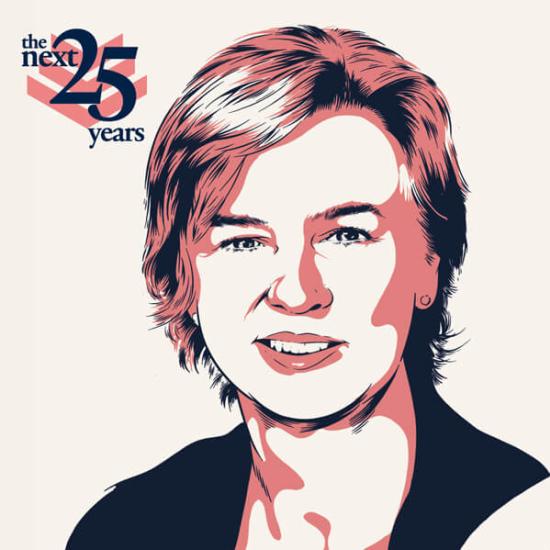‘We all quit. Sorry for the inconvenience.’ This was a sign posted by staff outside Burger King in Lincoln, Nebraska, July 2021.
In China, they call it tang ping, the art of spurning difficult jobs in favour of ‘lying flat’. In business magazines, it’s termed the turnover tsunami. But for most of the western world, it’s become known as ‘the Great Resignation’, the seismic social shift that has seen job vacancies hit record highs. In the US, four million people have been quitting their jobs every month since April 2021, resulting in ten million job vacancies over the summer, while in Germany a third of companies have bemoaned a lack of skilled workers.

With the pandemic forcing many to reassess careers or working conditions, employees are showing signs of flexing hitherto unknown power. This could explain the Burger King workers in Nebraska who, tired of understaffing issues and toiling 60-hour weeks without air conditioning, staged a walkout (but not before modifying that company sign). Or it could be manifesting itself in the 54% of global workers who said they would quit their jobs if they weren’t offered flexible working after the pandemic.
The Great Resignation is no Marxist workers’ revolution. But it appears corporations are considering the determinants driving the exodus: concerns around employee wellbeing, mental health and poor company culture. The shift towards hybrid working has largely stemmed from discussions companies have had with their staff; a further sign that the power that bosses once exercised over their staff is reducing.
‘Today, leaders are more accountable for their actions and staff, but not in control,’ says Sue Dopson, Professor of Organisational Behaviour and Interim Dean. ‘It’ll be one of the biggest challenges for leaders.’
Changing attitudes
The trend was evident even before the pandemic. In From Ego to Eco: Leadership for the Fourth Industrial Revolution, a paper that Sue co-authored, 25 leaders were interviewed about the changing role of authoritative leadership within their organisations.
Their comments read like a harbinger of post-pandemic manager-employee relationships. Executives talked of traditional managerial hierarchies evaporating, with rank no longer a guarantor of power. As one leader said: ‘Dissent and conflict are the new norm. Commitment, loyalty and trust tend to be short term, and relationships more transactional, reducing the levers of influence.’

This deference started to ebb during the 2008 financial crisis, when public confidence in government and financial institutions plummeted. Since then, a clutch of corporate scandals – the BP Deepwater oil spill, Volkswagen emissions cover-up, Toshiba’s accounting woes – have corroded trust in big business too. Today, 63% of Americans have little confidence in elected officials (see this Pew Research survey) and 56% are likewise distrustful of their corporate leader. While the public reputation of leaders has nosedived, the use of technology has risen. Around the time the School was founded in the mid-1990s, email took off in academic institutions. Tutors accustomed to students nervously knocking on their door observed a chatty, informal style appearing in their emails (see this 2007 Georgetown University study for more).
Whether the new email etiquette represented impertinence or not, it spread to the business world and research by Alison R Fragale at the University of South Carolina showed that employees’ emails to bosses conversely contained less deferential language than those sent to their colleagues.
Easily held to account
The advent of social media has amplified this. Not only can the public contact leaders 24/7, they can also pore over their tweets to potentially judge them for their actions. One From Ego to Eco interviewee likened the new climate to ‘leading in a glass box’. The School’s 2015 CEO Report: Embracing the Paradoxes of Leadership and the Power of Doubt found that ‘the specific demands of sudden visibility and scrutiny… take CEOs by surprise’ and that their role is becoming ‘more complex as competing and increasingly vocal stakeholders permeate organisations’.

Noticeably, complaints against bosses have become more commonplace, ranging from the #MeToo movement to high-profile allegations against WeWork co-founder Adam Neumann and Topshop tycoon Sir Philip Green. When KPMG UK chair Bill Michael told staff to 'stop moaning' and 'playing the victim card' during a virtual meeting about Covid-19, workers inevitably complained, resulting in his resignation.
‘Today’s leaders need more “HR nous”,’ says Sue. ‘People can pull out a grievance at any time… as a leader you need to be able to deal with that’.
Bosses have now seen into people’s houses via Zoom. They have a window into their lives which helps them understand them more holistically
From hero to servant?
A recent global study of 5,500 people by Adobe found that the Great Resignation is also driven by millennials and Generation Z: more than half (59%) are dissatisfied with their jobs or work-life balance (56%). These generations seek a meaningful work culture rather than long hours, bullying bosses and office-related stress.
Yet some boardrooms are taking notice. Possibly in a bid to retain young talent in the face of millennial burnout, many companies have strengthened their mental health policies during the pandemic, ranging from managers at smaller firms conducting daily Zoom check-ins for remote workers to those offering paid weeks off for mental health breaks, as Nike, LinkedIn and Bumble have done.
‘The challenge of being responsible for people’s mental health wasn’t there before,’ says Sue. ‘During the pandemic, bosses have seen into people’s houses via Zoom. That’s been important: they have a window into employees’ lives which helps them understand them more holistically.’
Corporate caring can have a whiff of inauthenticity about it but if future leaders want to resonate with (and win over) staff, the classic archetype of ‘heroic’ leadership may no longer work. It raises the question: is the egocentric, tyrannical boss about to be shown the door?
‘The idea of leader as hero was disappearing before the pandemic anyway,’ says Sue. She says today’s empathetic managerial style recalls servant leadership: a strain of leadership theory where the goal of the leader is to serve. ‘I think we’re seeing now the notion of leadership as service, not just for the organisation, but to develop others, help them cope and get meaning from their work,’ she says.
Rachel Botsman, author of Who Can You Trust? and Trust Fellow, says: ‘Today, a leader can get fired or have to resign, like KPMG’s Bill Michael, if their employees or public think they don’t care. I think many leaders are still trying to figure out empathy… No matter what profession you’re in, empathy is at the table stakes for most forms of leadership.’
We’re seeing the notion of leadership as service, not just for the organisation, but to help others develop and get meaning from their work
Lead like a farmer
This burgeoning need to care doesn’t come naturally for many leaders. Likewise, the heightened stress levels that come with increased scrutiny or ‘blame culture’ accountability can leave many aspiring leaders to stop pursuing top jobs, believing they aren’t worth the hassle.
Such blame culture may inhibit leadership development. ‘Leaders could become more risk-averse, with some judgement and off the top-of-the-head thinking harder to do,’ says Sue.
Despite this, Sue says: ‘Leadership will always involve telling people what to do sometimes...At some points in organisational life, leaders will need to be the hero charging in, such as during the pandemic'.
How should those leaders brave enough to put themselves into the firing line of modern leadership navigate this complex new world? Making changes to organisational culture may be a good starting point, says Sue: ‘This has to be a style of leadership that runs throughout the organisation if it’s going to be successful. It needs to be a function of middle management with role models everywhere, not just the top boys and girls.’
Her point is illustrated in From Ego to Eco, which makes an analogy between modern leadership and agriculture: ‘Farmers don’t grow crops, they create the conditions for the crops to grow’. Or as Sue puts it: ‘Nurture, as well as lead’.
Don’t be a hero
The paper also suggests creating a sense of psychological safety within the workplace. In a diverse workforce, leaders should be pluralising participation, encouraging strong ideas from all areas of the organisation. It’s a milieu in which connecting with staff is equally as important as directing or delegating them.
It might be worth developing a thicker skin too, with From Ego to Eco noting leaders should ‘expect extensive criticism and get better at managing conflict’. To engage any millennial/Gen Z talent before they draft their resignation emails, enabling a shared sense of purpose could be crucial.

It might seem insurmountable but Sue points out that these skills aren’t innate and can be learnt.
‘The way we’ve taught leadership at the School has always been about not being the hero,’ says Sue. ‘We ask our MBA students to reflect on their own journey and what shapes them as a leader. It’s also important to be humble enough to know the type of problems we’re facing can’t be solved by one or two individuals.’
The Great Resignation has created a power vacuum at the core of many organisations. To fill it, an organisational structure based on relationship-building, conversations, diversity and a shared sense of purpose will prove to be much more beneficial in the next quarter-century than relying on hierarchical traditions such as command-and-control.
‘You’ll always get people with egos in business,’ says Sue. ‘But it’s those non-collaborative leaders who think they can do it all on their own, or who don’t embrace their vulnerability, learn publicly or display humility – these are the ones likely to fail over the next 25 years.’



